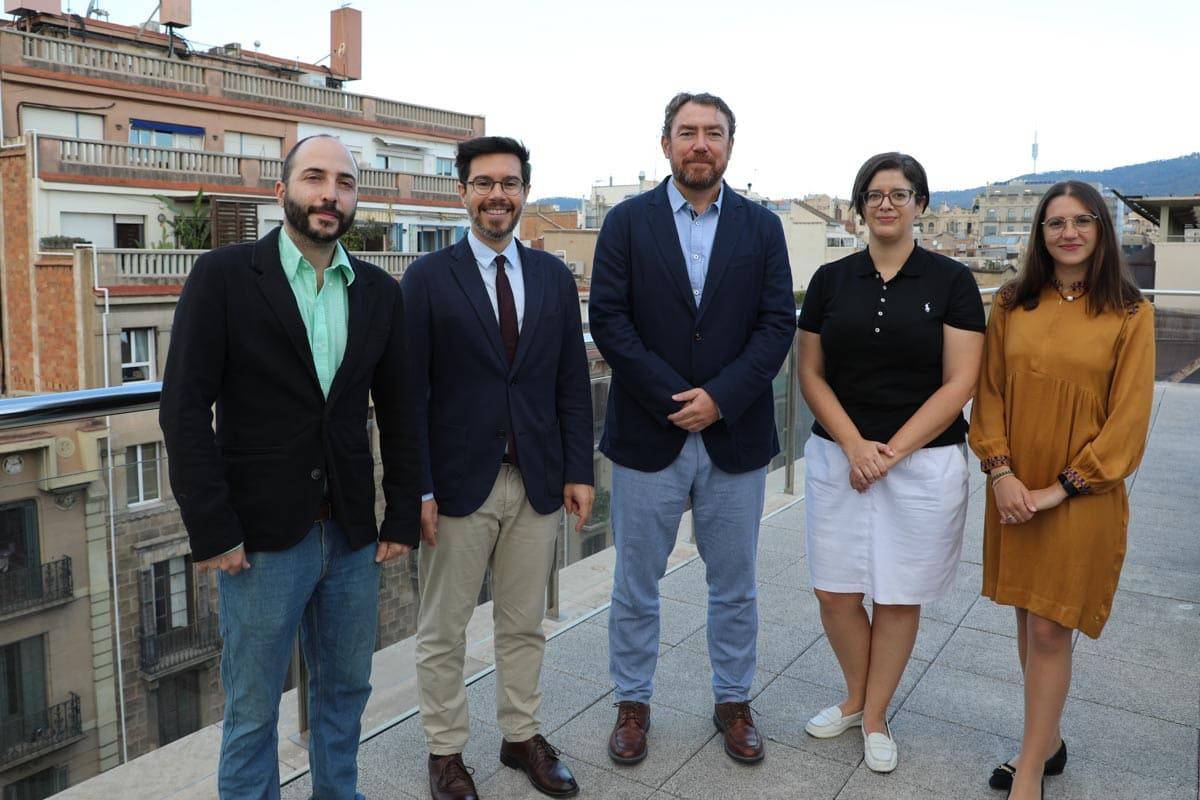
- About UPF-BSM
- Programs
- Faculty and research
- Companies and Organizations
- News & Events
UPF-BSM hosts Disrupting Thinking Research Event with academics from across disciplines to discuss conflict resolution and climate change
7 Octubre - 2022
For two days, the UPF Barcelona School of Management (UPF-BSM) hosted the Disrupting Thinking Research Event, an international research meeting which this year was focused on "Geoeconomics and the geopolitics of sustainability: a multidimensional approach". "This is a young research event, but highly recognised in the sector", said Toni Aira, Director of the Agbar Chair of International Studies in Institutional Communication for Growth and Sustainable Development –promoter of the event–, and added: "organising this meeting allow us to place ourselves on the international scene with the research we conduct at school, specifically on geopolitics and conflict resolution".
The meeting has compiled more than 30 studies on geoeconomics and geopolitics of sustainability by academics from up to 15 international universities
The different conferences and workshops held, structured with the support of the Technological University of Dublin (TU); the Universitat Oberta de Catalunya (UOC); the University of Limerick and the Université de Pau et des Pays de l'Adour, were based on the more than 30 studies compiled on the subject, carried out by academics from up to 15 international universities. "We have done something unusual in academia: unite disciplines", said Daniel Rajmil, coordinator and research promoter of the Agbar Chair. "The aim of the presentations was to escape from the traditional and join forces between different fields to produce and transfer knowledge in a cross-disciplinary way", he indicated.
In this regard, both Aira and Rajmil thanked Dr. Lucía Morales, Conference Lead, and Accounting and Finance Lecturer at Technological University of Dublin; Prof. Dr. Bernadette Andreosso-O'Callaghan, from the University of Limerick, and Prof. Dr. Jacques Jassaud, from the Université de Pau et des Pays de l'Adour, for their "priceless help" in organising the event and their "full collaboration" in coordinating the conference.
Research to counter global threats
"Climate change is a global threat and tackling it is a collective enterprise", stated, Oriol Amat, Rector of the Pompeu Fabra University (UPF), during the welcome session, in which he assured that the UPF Group is "fully committed" to contributing to this task with "research and knowledge transfer that allows institutions to promote ethical and sustainable policies in the long term".
Although Amat said that "we must care for and protect the planet", he also recalled the importance of "putting an end to authoritarian regimes", referring to the many conflicts currently raging on the international scenario. "I am thinking of the revolution that is taking place in Iran, the conflicts in Syria and the war in Ukraine, among others", he said.
The commitment of the UPF-BSM to planetary wellbeing and the desire to create knowledge on the subject are some of the reasons why Agbar chose the school to raise its chair
"What we can do from the academy is to shed light on the issue and generate knowledge on the subject", said the Director General of the UPF-BSM, José M. Martínez-Sierra. "As a school of management with a humanistic face, planetary well-being is our leitmotiv and that is why we support initiatives such as the Disrupting Thinking Research Event", explained Martínez-Sierra, who considered that the theme of the current edition "is the right one".
Sensitivity to the well-being of the planet and of people is, precisely, one of the causes that motivated Agbar to found its Chair with UPF-BSM. "Our aim was to promote the study of the Sustainable Development Goals (SDGs) and sustainability to contribute to the improvement of society", guaranteed José Guerra, the Director of Communication of the company.
Public-private partnership with sustainable sensitivity
In the words of the Vice-Dean for Knowledge Transfer, Ramon Bastida, organising this type of event is a "way to strengthen the ties of cooperation with other institutions in areas such as research and knowledge transfer". In this sense, Bastida celebrated the possibility of "making visible and promoting", with this type of meeting, the reputation of the 14 chairs and observatories of the UPF-BSM and giving them "international projection".
Events such as the current one allow to strengthen cooperation ties with other institutions in areas such as research and knowledge transfer
This idea was also shared by Aira, who considers that the Agbar Chair, focused on the analysis of instiutional communication linked to the 2030 Agenda, "is now positioned as a reference in this field of study, currently so prioritised at an international level by institutions of enormous relevance". In addition, according to its Director, hosting the Disrupting Thinking Research Event allows the Chari "to draw on the knowledge of great experts and to carry out important networking".
Both Aira and Guerra, both experts in communication, agreed on the importance of this tool in promoting sustainability. "Communication needs to be disruptive to reach all audiences and transmit all the knowledge generated by academia", said the Director of Communication of Agbar.